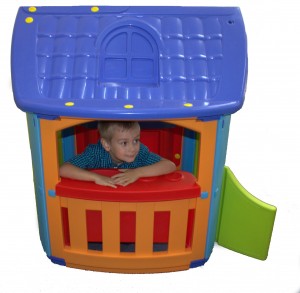
Occupational therapy is often recommended for children with special needs, but what is occupational therapy and what do OT's do?
"Occupational therapy is a client-centred health profession concerned with promoting health and well-being through occupation. The primary goal of occupational therapy is to enable people to participate in the activities of everyday life. Occupational therapists achieve this outcome by working with people and communities to enhance their ability to engage in the occupations they want to, need to, or are expected to do, or by modifying the occupation or the environment to better support their occupational engagement".(World Federation of Occupational Therapists 2012)
But children don't have an "occupation" in the same way adults do so what does this mean for children?
OT's help children "participate in the activities of daily life". These are things that children want to do, such as play activities; need to do, such as daily living activities like eating, dressing and toileting; and are expected to do, such as academic activities like reading and writing.
It focuses on tasks that children do:
- At home such as sleeping, toileting, mealtimes, dressing, bathing, grooming
- At preschool school and child care such as listening, paying attention, playing, fine and gross motor skills, reading, writing
- In social settings such as playing and social interaction
- When using tools such as pencils, scissors, button, shoelaces, cutlery
OT's can help children develop skills in the following areas:
Fine motor skills: these are tasks which require careful control of movements, usually involving the hands, such as cutting, drawing, writing, threading, building, doing puzzles and so on. Problems with fine motor skills can lead to problems with handwriting and daily activities such as using cutlery, doing up buttons and tying shoelaces.
Gross motor skills: these are whole body movements such as sitting, walking, crawling, and climbing. Skills such as balance and maintaining a stable posture are important for focus and being able to do fine motor tasks.
Sensory processing: this relates to the way a child makes sense of messages from their senses of vision, hearing, smell, touch, taste and movement. Children need to focus on what is important and ignore what is not. Some children are under-sensitive to messages from their senses and so may seek out more stimulation by constantly moving, touching, or mouthing things. Others are over-sensitive and find it hard to ignore unimportant sensations of sound, movement, touch or visual information that others block out. This may make it hard for them to focus and they may be distracted and irritable or they may try to avoid situations where feel overstimulated.
Activities of daily living such as eating, settling to sleep, toileting, dressing, grooming.
School readiness such as attention, concentration, posture control, pencil skills, memory skills and visual perception.
Play skills such as imitation, social play, imaginative play and pretend play.
How would an occupational therapist work with my child?
An occupational therapist will:
- gather information about the child from parents and other important people in the child's life such as teachers or carers
- assess the child's skills through watching the child do specific tasks. This may include the use of tests designed specifically to assess certain skills.
- analyse the child's strengths and weakness
- develop a suitable intervention program
- help the child to develop target skills though specially chosen activities in therapy sessions and through home and school programs
- provide strategies for parents, teachers and carers to support the child in their daily activities.
Children who can benefit from an occupational therapist include:
- children with developmental delays or disabilities including autism spectrum disorders, intellectual disabilities, physical disabilities and learning difficulties
- children who have difficulties with attention, concentration, staying on task or sitting still
- children who have difficulties with handwriting
- children who have difficulties using things such as cutlery, scissors, buttons, shoelaces, pencils
- children who are poorly coordinated or lack confidence with physical tasks
- children who have difficulties with daily activities such as eating, sleeping, dressing, bathing, toileting
- children who are over-sensitive to noise, touch, smell, taste, movement or textures
- children who seek stimulation by excessive touching, fiddling, wriggling, chewing or mouthing objects
- children who have difficulties regulating their emotions or behaviour which may result in tantrums, meltdowns and other behaviours
- children who are delayed in the development of play skills or social skills
Where can I find an occupational therapist?
Occupational therapists work in health, education and disability settings and in private practice. Your child's teacher, general practitioner or child health nurse should be able to tell you about occupational therapists in your area. Talking Matters has a new occupational therapy service and is now taking bookings for term 2.
What costs are involved?
Public services are usually free but often have long waiting times and eligibility restrictions. Private services have a cost associated with assessment and therapy sessions which may be covered by private health insurance for eligible families. Families may be eligible for rebates through Medicare if a plan is developed with their GP. Occupational therapy is available under the "Helping children with autism" and "Better start" programs and the new OT service at Talking Matters is registered with these programs. More information about costs and rebates is available on our website.
Related posts:
Calm alert and learning
Playing together
Baby play
The importance of play
Fun with pretending
Managing emotions
Success with ASD
Work 50/50 with ASD kids
What is autism?
What is Asperger's?
What is PDD-NOS?
Create and learn
Play and floortime
Developing play
Related Blog Posts
If you liked this post you may also like:
Using praise
10 uses for Xmas Lego!
Follow Our Socials for MORE Ideas
Playground Play - Supporting Your Child's Development



